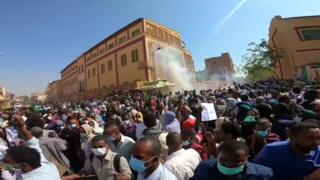Tear gas used as Sudan protests continue
 Reuters
Reuters
Sudan's security forces have fired tear gas at protesters near the capital, Khartoum, in continuing unrest.
Hundreds of people were targeted outside a mosque in Omdurman after activists called for protests to take place after Friday prayers.
Demonstrations have also erupted in areas of north Khartoum, and other cities including Port Sudan and Atbara.
The Sudanese authorities have also been accused of arresting nine prominent opposition activists.
At least 19 people have died during nine days of anti-government protests, the government says.
But on Tuesday, Amnesty International said it believed that 37 protesters had been shot dead.
In a joint statement, several groups involved in the protests said nine opposition leaders had been arrested in Khartoum. The individuals reportedly include Siddiq Youssef, a senior leader of Sudan's Communist Party, and leaders from the pan-Arab Ba'ath and Nasserist parties.
A spokesperson for Sudan's intelligence agency - the National Intelligence and Security Service - denied any knowledge of the arrests.
Protests first erupted in Sudan on 19 December after the government announced price rises for fuel and bread.
The protests have escalated into broader calls for an end to the 29-year rule of President Omar al-Bashir. Activists accuse him of mismanaging the economy.
Over the past year, the cost of some goods has more than doubled, while the Sudanese pound has plunged in value.
Three-quarters of Sudan's oil wealth has been lost after the country's southern half voted to secede in 2011, leading to the formation of South Sudan.
Its economy has also been strained by over 20 years of US sanctions, which were lifted in October 2017. The US had introduced economic sanctions after accusing Sudan of sponsoring terrorist groups.
Mr al-Bashir's regime has been accused of widespread human rights abuses.
In 2009 and 2010, the International Criminal Court (ICC) charged him with several counts of genocide, war crimes and crimes against humanity, and a warrant was issued for his arrest.
Source: bbc.com


Comments